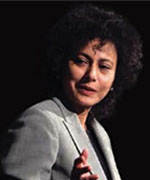7th Annual Hawke Lecture
Security for Whom? Redesigning Security, Reinforcing Human Rights
With Irene Khan Secretary, General Amnesty International
Wednesday 8 September 2004
Published copies of the Annual Hawke Lecture series are available from the Hawke Centre.
Biography
 Irene Zubaida Khan joined Amnesty International as the organization's seventh Secretary General in August 2001.
Irene Zubaida Khan joined Amnesty International as the organization's seventh Secretary General in August 2001.
Taking the helm in Amnesty International as the first woman, the first Asian and the first Muslim to guide the world's largest human rights organization, Irene brought a new perspective to the organization. As an individual, she brought experience and enthusiasm for putting people at the heart of policy.
Irene took up the leadership of Amnesty International in its 40th anniversary year as the organization began a process of change and renewal to address the complex nature of contemporary human rights violations, and confronted the challenging developments in the wake of the attacks of 11 September.
In her first year in office, Irene reformed AI's response to crisis situations, personally leading high level missions to Pakistan during the bombing of Afghanistan, to Israel/Occupied Territories just after the Israeli occupation of Jenin, and to Colombia before the Presidential elections in May 2003. Deeply concerned about violence against women, she called for better protection of women's human rights in meetings with President Musharraf of Pakistan, President Lahoud of Lebanon and Prime Minister Khaleda Zia of Bangladesh. She has initiated a process of consultations with women activists to design a global campaign by Amnesty International against violence on women.
Irene has been keen to draw attention to hidden human rights violations. In Australia, she drew attention to the plight of asylum seekers in detention. In Burundi, she met with victims of massacres and urged President Buyoya and other parties to the conflict to end the cycle of human rights abuse. In Bulgaria, she led a campaign to end discrimination of those suffering from mental disabilities.
Interested in working directly with people to change their lives, Irene helped to found the development organization, Concern Universal, in 1977, and began her work as a human rights activist with the International Commission of Jurists in 1979.
Irene joined the United Nations High Commissioner for Refugees in 1980, and worked in a variety of positions at Headquarters and in field operations to promote the international protection of refugees. From 1991-95 she was Senior Executive Officer to Mrs. Sadako Ogata, then UN High Commissioner for Refugees. She was appointed as the UNHCR Chief of Mission in India in 1995, the youngest UNHCR country representative at that time, and in 1998 headed the UNHCR Centre for Research and Documentation. She led the UNHCR team in Former Yugoslav Republic of Macedonia during the Kosovo crisis in 1999, and was appointed Deputy Director of International Protection later that year.
Irene studied law at the University of Manchester and Harvard Law School, specialising in public international law and human rights. She is the recipient of several academic awards, a Ford Foundation Fellowship, and the Pilkington "Woman of the Year" Award 2002.
Biography kindly supplied by Amnesty International
While the views presented by speakers within the Hawke Centre public program are their own and are not necessarily those of either the University of South Australia or The Hawke Centre, they are presented in the interest of open debate and discussion in the community and reflect our themes of: strengthening our democracy - valuing our diversity - and building our future.
The copying and reproduction of any transcripts within the Hawke Centre public program is strictly forbidden without prior arrangements.



